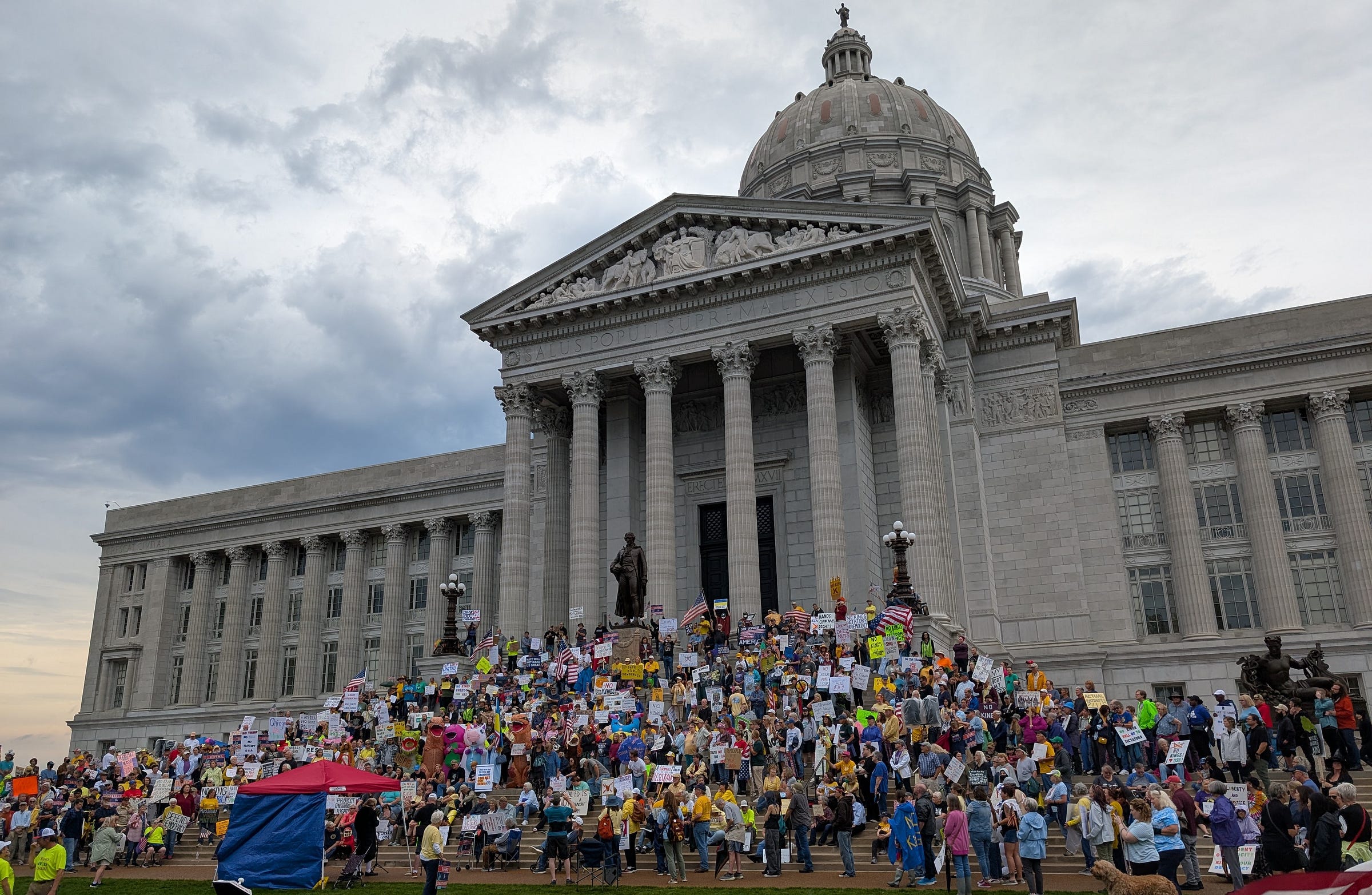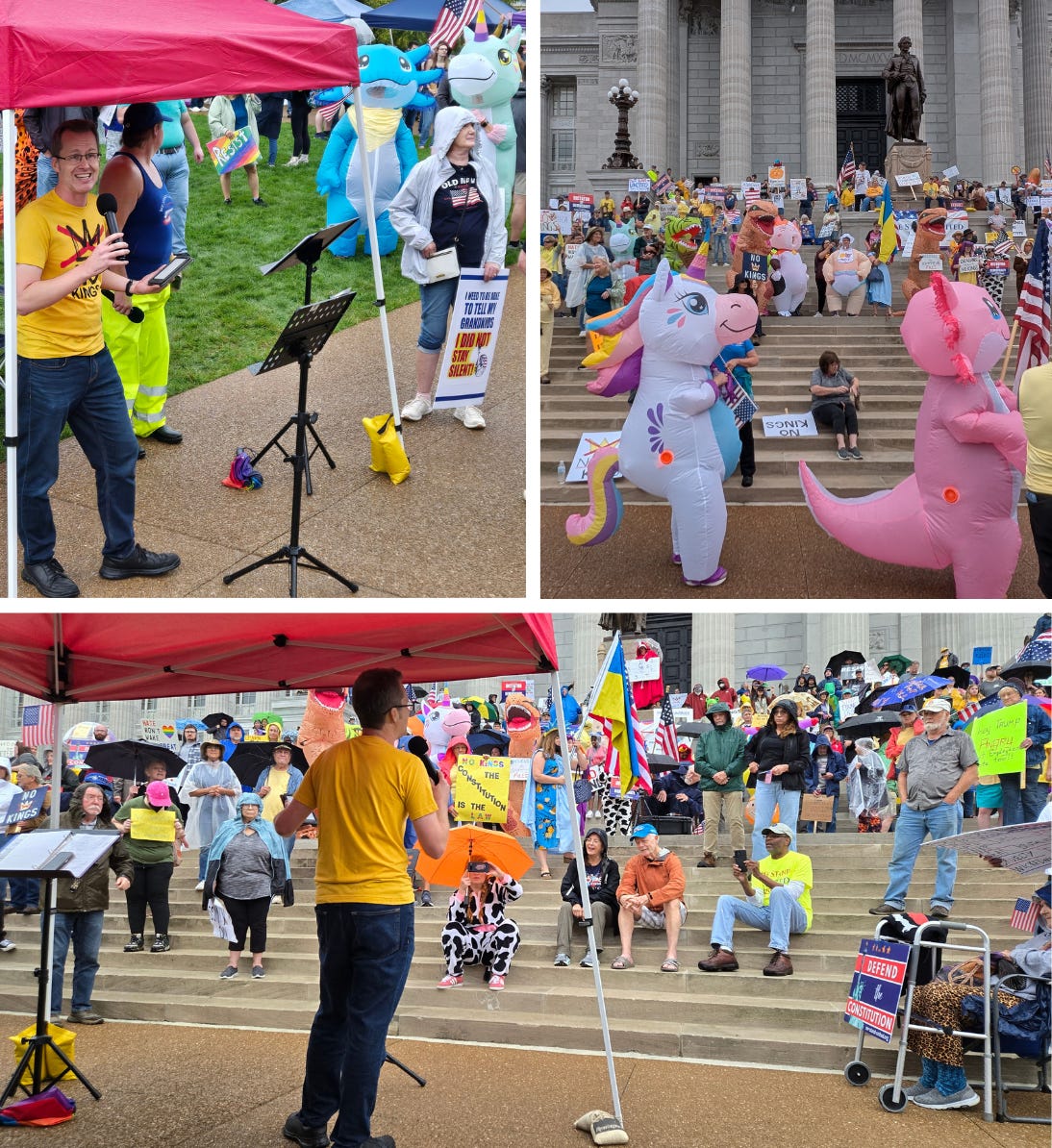No Kings, No Christian Nationalism
On Saturday (Oct. 18), millions of people attended “No Kings” rallies at about 2,600 locations across the country. The estimated total participants was somewhere around six million people. Not only did the crowds top the previous No Kings effort in June, but that also means it was probably the largest day of rallies in the U.S. since the first Earth Day in 1970.
Across the nation, many clergy participated along with numerous lay Christians. Despite that, some attempted to paint the rallies as godless or anti-Christian. Conservative pundit Erick Erickson claimed that those attending No Kings wouldn’t be in church the next day because the rallies were their “secular religion of self-importance.” And Republican Rep. Chip Roy of Texas portrayed the rallies as just “Marxists, radicals, and Islamists” opposed to people like President Donald Trump who follow Jesus. While Trump tears down the White House, Erickson and Roy seek to destroy the Christian witness.
Despite the claims of Erickson and Roy, I saw something quite different when I attended a No Kings rally on Saturday at the Missouri Capitol in Jefferson City. There were multiple pastors there along with many people who are active in their congregations. There were also several signs with Christian messages (much like what I saw during the No Kings rally I attended in June at the Iowa Capitol in Des Moines).
For Saturday’s rally, I was asked by local organizers to offer remarks on the importance of church-state separation and the dangers of Christian Nationalism. Even with rain, several hundred people showed up and stayed to listen to the various speakers. I cut about a quarter of my remarks since we were wrapping up early due to a thunderstorm. You can watch my remarks as I delivered them. Or, if you prefer, I’ve included my prepared remarks below.
No kings also means no theocracy, no government control over religion, no Christian Nationalism.
In the old European model before the start of the American experiment, the religion of a nation was often tied to the king. If the monarch changed religion, then the nation changed as well. Or if a new monarch rose to the throne or took over your land, you were expected to change your faith to match. This, of course, not only sparked bloody wars and persecution, but it also led to many people fleeing their homes as religious refugees, or pretending to convert whether they actually believed or not, or creating secret houses of worship.
So it should come as no surprise that the first call for true religious liberty for all people included a criticism of monarchy. In 1612, one of the leaders of the first Baptist church in the world, Thomas Helwys, published his book A Short Declaration of the Mystery of Iniquity. With it, he became the first person in western civilization to call for complete religious freedom for all people, demanding that right not just for his group of persecuted Baptists but also for others like Jews, Muslims, and atheists. He sent a copy to the king of England. The king, as head of the state church, didn’t like it, so he sent Helwys to prison where Helwys died a few years later.
Here’s what Helwys scribbled in the front of the copy he sent to the king: “Hear, O King, and despise not the counsel of the poor and let their complaints come before thee. The king is a mortal man and not God, therefore hath no power over the immortal souls of his subjects to make laws and ordinances for them and to set spiritual lords over them. If the king have authority to make spiritual lords and laws, then he is an immortal god and not a mortal man.”
You see, no kings also means no theocracy, no government control over religion, no Christian Nationalism.
By the way, the king that Helwys sent that note to and who then sent Helwys to his death in prison was King James. Perhaps you’ve heard of him, or even have a Bible with his name on it. Yes, at the very moment Helwys was writing his defense of religious liberty, King James released his “authorized” Bible. The king wanted to control the faith. It goes to show that just because an authoritarian leader sells a Bible, that does not mean they are devout or godly.

This radical idea of separating church and state was picked up in the American colonies by early Baptists like Roger Williams, Isaac Backus, and John Leland, and by politicians like James Madison and Thomas Jefferson. That’s why when Jefferson wrote to a group of Baptists in New England, he declared, borrowing a metaphor from Roger Williams: “Believing with you that religion is a matter which lies solely between Man & his God, that he owes account to none other for his faith or his worship, that the legitimate powers of government reach actions only, & not opinions, I contemplate with sovereign reverence that act of the whole American people which declared that their legislature should ‘make no law respecting an establishment of religion, or prohibiting the free exercise thereof,’ thus building a wall of separation between Church & State.”
But monarchs and would-be authoritarians do not like the idea of church-state separation because it limits their power over an important area of life. That’s why the administration today wants to tell you when and how to pray, even creating an initiative to encourage patriotic prayers for the nation between now and the 250th anniversary of the U.S. next year. But I don’t need Pharaoh or Caesar to tell me to pray. This administration is also co-opting Bible verses, using them in promotional videos for ICE and the Department of War in a heretical attempt to sanctify imperial violence. But I have a verse for them: “Woe to those who call evil ‘good.’” The administration has also attacked religious leaders who voice a different opinion, like condemning an Episcopal bishop for urging the president to show mercy to LGBTQ children, criticizing Lutherans for ministering to refugees, and even shooting a Presbyterian pastor in the head with a pepper ball for praying during a peaceful protest against ICE.
And the push for such Christian Nationalism can also be found in this building as lawmakers keep trying to privilege one faith over others, to suggest to children in public schools that they are second class citizens if they do not have the “right” religious beliefs. Some of our lawmakers want to force a gerrymandered version of the Ten Commandments in public school classrooms. They started with the KJV text, which means they are using the Protestant ordering and not that of Catholics and Jews who organize the Ten Commandments differently. With that, they would be saying to children, these are the Ten Commandments and if your parents or house of worship puts it differently, they are wrong. The government should not be picking winners and losers when it comes to religion. But it gets worse. The bill to force schools to post the Protestant text actually edits it, deleting 63% of the text, including references to the people being freed from slavery. Even worse, the proposed version rewrites part of the Ten Commandments. Yes, I sat in committee and watched them vote to rewrite the Bible. That’s what authoritarian Christian Nationalists do. But we do not need a Missouri General Assembly Version of the Bible!
We must say “no” to such Christian Nationalism, to such attempts to tear down the wall of separation between church and state that protects the religious liberty rights of all of us. The separation of church and state is good for both. That’s why no kings also means no theocracy, no government control over religion, no Christian Nationalism.
As a public witness,
Brian Kaylor




"It goes to show that just because an authoritarian leader sells a Bible, that does not mean they are devout or godly."
Indeed, when tyrants insist on religious conformity, it means they intend to co-opt God to bless their actions, so that no prophets can call them to account.
Thank you for being one of our modern-day prophets.
You are protesting a democratically-elected president.
Because your undemocratically-selected candidate lost.
https://amgreatness.com/2025/10/23/who-are-the-real-kings/